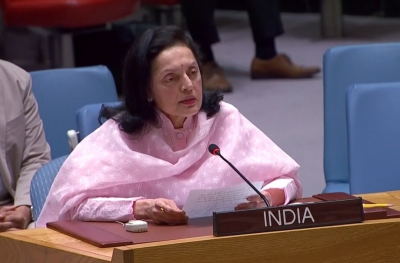United Nations: India has expressed concern over the “recent developments” in Ukraine in broad terms without mentioning any country while introducing an element of indirect criticism of Russia for ending a UN-sponsored arrangement to allow shipments of foodgrains and agriculture-related products through the Black Sea.
Speaking at a regularly scheduled meeting of the General Assembly on Ukraine Tuesday, India’s Permanent Representative Ruchira Kamboj said: “We are concerned about recent developments in the region which have not helped in securing the larger cause of peace and stability. Reports of attacks on civilians and civilian infrastructure are deeply worrying.”
In the last two days, Russia launched a drone and missile attack on the Ukrainian port of Odesa, while a bridge connecting the Russian mainland to the occupied territory of Crimea was partially destroyed.
Amid these developments, Russia withdrew from the Black Sea Grain Initiative to allow shipments of foodgrains and agriculture-related products through the Black Sea.
Referring to this development, Kamboj said: ”India has supported the efforts of the UN Secretary-General (Antonio Guterres) in continuing the Black Sea Grain Initiative, and hopes for an early resolution to the present impasse.”
Maintaining New Delhi’s delicate balancing act on the Ukraine issue over which it faces tremendous pressure from the West, while being dependent on Russia for crucial defence and energy needs, she did not name either country.
But she repeated Prime Minister Narendra Modi’s oft-quoted statement, “this is not an era of war”, which has been interpreted as a criticism of Russia.
“In light of my Prime Minister’s repeated engagements with both sides, it is essential to emphasise that we firmly believe that this is not an era of war.”
Modi has been in touch with both presidents, Vladimir Putin of Russia and Volodymyr Zelensky of Ukraine.
In another implied criticism of Moscow over its ongoing invasion, Kamboj said: “The global order that we all subscribe to is based on international law, the UN Charter and respect for the territorial integrity and sovereignty of all states. These principles must be upheld without exception.”
She added an indirect criticism of Moscow for scuttling the Black Sea Grain Initiative that provided a lifeline of foodgrains to many developing countries and moderated food prices.
“It is also unfortunate that as the trajectory of the Ukranian conflict unfolds, the entire Global South has suffered a substantial collateral damage.
“It is thus critical that the voice of the global south be heard, and their legitimate concerns be duly addressed,” she added.
Putin recently raised the spectre of the nuclearisation of the battlefield by declaring last month that Russia has placed tactical nuclear weapons in its ally Belarus, which borders Ukraine.
Reacting to this development, General Assembly President Csaba Korosi warned: “We cannot play with a nuclear Armageddon. Nuclear rhetoric must be stopped.
“I must repeat what I have said before: Nuclear arms will not solve a conflict.”
He also referred to the Zaporizhzhia Nuclear Power Plant in areas occupied by Russia over which there are fears of sabotage and accident.
“The risk of a cataclysmic disaster or accident rises every day this war goes on. Amidst this turmoil, the threat of a nuclear catastrophe looms ominously over our heads — with Europe’s largest nuclear power plant located in an active conflict zone, posing grave, imminent danger far beyond the region,” Korosi added.
IANS
